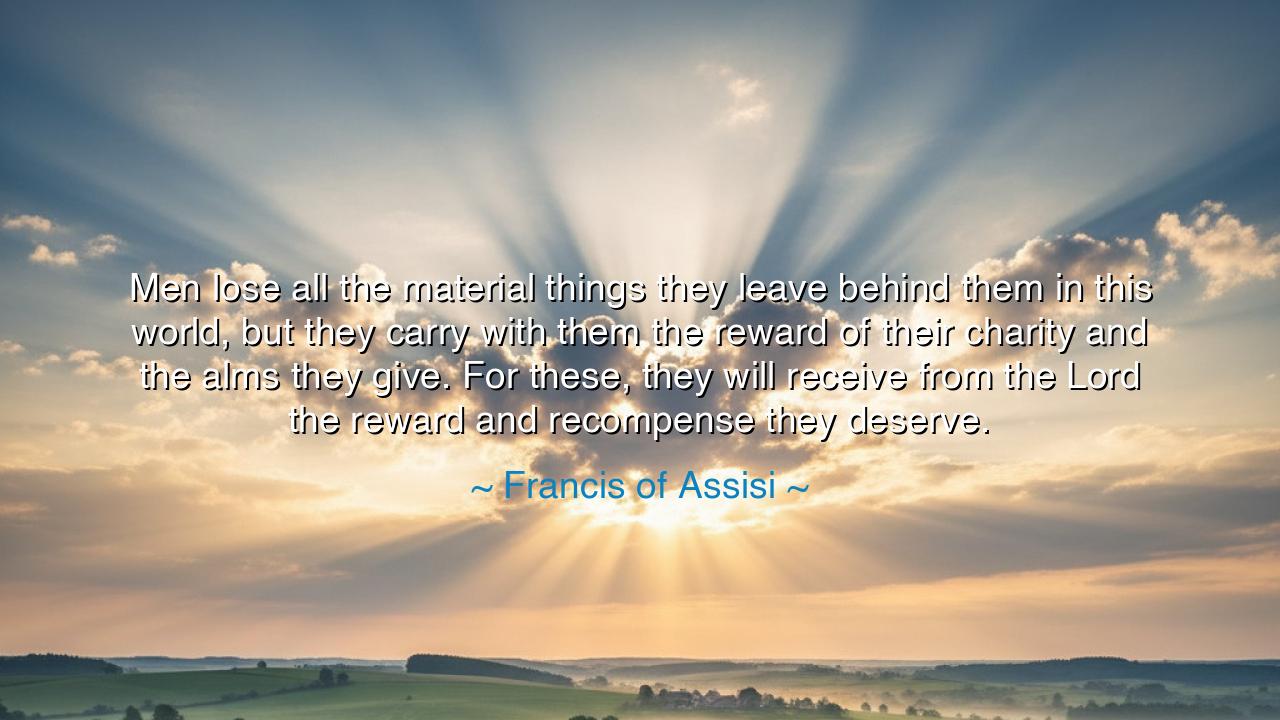
Men lose all the material things they leave behind them in this
Men lose all the material things they leave behind them in this world, but they carry with them the reward of their charity and the alms they give. For these, they will receive from the Lord the reward and recompense they deserve.






The words of Francis of Assisi, “Men lose all the material things they leave behind them in this world, but they carry with them the reward of their charity and the alms they give. For these, they will receive from the Lord the reward and recompense they deserve,” rise like a torch in the dark corridors of time. They speak to the eternal truth that wealth, power, and possessions are fleeting dust, clinging only while life’s breath remains. Yet the acts of charity, the open hand that gives without seeking return, become eternal coins stored not in the vaults of this earth but in the treasuries of heaven. In this way, Francis, the humble saint of Assisi, sought to remind mortals that while gold tarnishes and kingdoms fall, the fragrance of mercy endures beyond the grave.
This teaching springs from the heart of medieval Christendom, in an age when knights fought for glory, and merchants filled their chests with silver. Francis, once heir to wealth himself, cast off all worldly splendor to live among the poor. From his poverty was born wisdom: that no man can carry riches across the river of death. Yet what he gives in love, alms, and kindness sails with him like a lantern through eternity. It is not the measure of coin in a man’s purse that endures, but the measure of compassion in his soul.
History gives us many witnesses to this truth. Consider the story of the Roman general Marcus Crassus, once said to be the richest man in Rome. His coffers overflowed with silver, his estates stretched wide, and yet, when death claimed him in a failed campaign, he bore nothing into eternity. His wealth, once envied, became a hollow monument, and his name survives not for mercy but for ambition. Contrast this with the life of a lesser-known figure: Elizabeth of Hungary, a princess of the thirteenth century. She gave her fortune to feed the poor, washed the wounds of lepers, and clothed the beggars of her land. When she died at only twenty-four, her charity became her crown, and her memory lives not in stone palaces but in the warm light of her deeds.
Francis of Assisi understood this contrast deeply. He had seen the hollow pride of merchants who clung to their coins and the joy of peasants who shared their bread. His words remind us that the true recompense of life is not counted in gold but in gratitude, not in monuments of stone but in the tears we wipe from another’s eyes. It is in the secret alms, the unnoticed act of kindness, that a soul prepares its eternal harvest. For the Lord does not measure as men measure; He counts not what we keep, but what we give.
And yet, the quote does not merely whisper of heaven’s rewards—it thunders with a warning: all material things will be lost. The mighty castles of lords crumble, and the treasures of kings are stolen by time. If we build our lives upon possessions alone, we shall face eternity with empty hands. But if we have fed the hungry, clothed the naked, and comforted the afflicted, then we step beyond the veil carrying treasures the rust of the world cannot touch.
For us who live in the modern age, the lesson is no less urgent. Though we may not wear armor or tread the halls of medieval courts, we too are tempted to measure life in possessions—houses, devices, ornaments of pride. But these, too, will be left behind. The call of Francis rings still: give while you live. Do not hoard what cannot last. Seek out the stranger in need, the neighbor in sorrow, the child in want. These are the investments that never fade.
Let us then take away a clear teaching: life’s true wealth lies in generosity. The soul that clings to charity walks crowned into eternity, while the one that clings to possessions departs naked. Practical actions follow easily: set aside something each day for the poor; give not only money but also time, listening, and kindness; remember that every act of mercy is a seed sown in eternal soil.
And so, O reader, as you walk the path of fleeting days, remember the wisdom of the saint: all else is lost, but charity endures. Give, therefore, as one who knows the end, and let your legacy be written not in fading ink upon paper, but in the everlasting script of mercy upon the hearts of men. For this is the reward, this is the recompense, and this is the true inheritance that death itself cannot steal.






AAdministratorAdministrator
Welcome, honored guests. Please leave a comment, we will respond soon